香港朗文小学英语4A-Chapter1-Knowing our friends.ppt
香港朗文4A教学目标家长解读版

尊敬的各位家长:大家好!新学期新起点,新内容新目标。
现将本学期教学纲要整理如下,请家长查看。
希望在后期的教学中,能得到您的支持和配合,家校携手助力学生成长!四年级朗文英语上册:附第一单元导学单:4A chapter1 Knowing our friends了解我们的朋友们一.、重点单词和短语【Part A/B】1.read—reading读书2.paint—painting画画,侧重于上颜色(draw —drawing画画,偏向于画线条)3.dance—dancing跳舞4.roller-skate—roller-skating滑旱冰5.jog—jogging 慢跑6.swim—swimming游泳7.play—playing chess下棋8.listen—listening to music听音乐9.spare time 闲余时间10.like v.喜欢11.what pron.什么12.do v./aux 做(does单三)13.I 我(第一人称)14.you 你(第二人称)15.he 他(第三人称)16.she 她(第三人称)17.it它(第三人称)18.we我们(第一人称)19.you你们(第二人称)20.they他/她/它们(第三人称)【Part E】1.book display n.图书展示2.Central Library n.中央图书馆3.Sports Center n.运动俱乐部4.City plaza n.城市广场5.City Hall n. 市政厅6.Dance Day n.舞蹈日7.ice-skate --ice-skating v.溜冰8.play -playing table tennis v.打乒乓球9.too, 表肯定“也是”;either, 表否定“也不”10.at the weekend 在周末11.me too 我也是12.me either 我也不13.good idea 好主意【Part F】1.sing-singing v.唱歌2.play football --playing football v.踢足球3.can v.能够4.go dancing 去跳舞5.together adv.一起二、重点句型1.-What do you like doing in your spare time? 你在业余时间喜欢做什么?-I like swimming, reading and listening to music. 我喜欢游泳、读书和听音乐。
香港朗文4a各单元总结
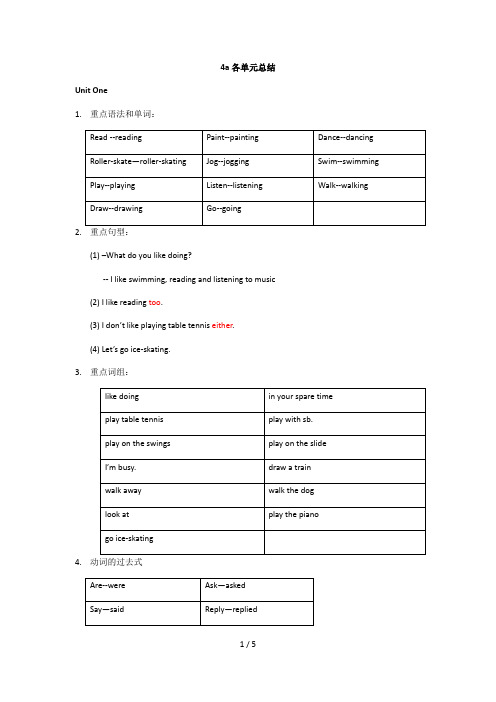
4a各单元总结Unit One1.重点语法和单词:2.重点句型:(1) –What do you like doing?-- I like swimming, reading and listening to music(2) I like reading too.(3) I don’t like playing table tennis either.(4) Let’s go ice-skating.3.重点词组:4.动词的过去式Unit two1.重点语法和单词:2.重点句型:(1)--Do you ever tidy your room?-- Yes, I usually tidy my room.(2)—Does she ever play the violin?-- No, she never plays the violin.-- No, she doesn’t play the violin.3.重点词组:4.动词的过去式Unit Three1.重点语法:2.重点单词和词组:3.重点句型:(1)--Was there any cola when you were young?-Yes, there was.(2)The game I like best was marbles.(3)How do you play marbles?(4)– Did you wear trainers fifty years ago?--Yes, I did.(5)—Did you have a telephone?-- No, I didn’t. Rich people had telephones at home but poor people didn’t.(6 ) – Did you shop at the supermarket?--- No, I didn’t. There weren’t any supermarkets.(7) – Did you go to school?-- No, I didn’t. Rich children go to school but poor children didn’t.(8) –Did you listen to the radio?-- Yes, I did.Where(哪里)do you like going to in your holiday?How(如何)do you help at home?How much (多少钱,提问不可数名词)is it? --- It is five dollars. How many (多少,提问可数名词)books in your home?What time(什么时间)is it?What(什么)are you doing now? ----I am doing my homework. What(什么)is the weather like today? ----It’s windy.What color (什么颜色)is it? ---- It is red.What (什么)are you? ( What do you do?) -----I am a driver.When(什么时候)is your birthday? ---on 2nd MayHow old(多大)are you? ----I am ten.Who (谁) are you? -----I am David.Which(哪一个) club do you want to join?Why(为什么)do you like playing football?----Because I like being healthy.。
最新香港朗文4A各单元知识要点 词汇语法
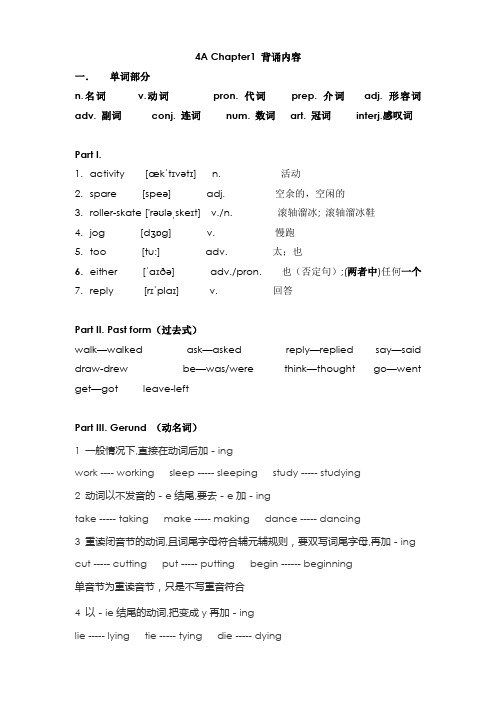
4A Chapter1 背诵内容一.单词部分n.名词v.动词pron. 代词prep. 介词adj. 形容词adv. 副词conj. 连词num. 数词art. 冠词interj.感叹词Part I.1.activity [ækˈtɪvətɪ] n. 活动2.spare [speə] adj. 空余的,空闲的3.roller-skate ['rəʊləˌskeɪt] v./n. 滚轴溜冰; 滚轴溜冰鞋4.jog [dʒɒg] v. 慢跑5.too [tu:] adv. 太;也6.either [ˈaɪðə] adv./pron. 也(否定句);(两者中)任何一个7.reply [rɪˈplaɪ] v. 回答Part II. Past form(过去式)walk—walked ask—asked reply—replied say—said draw-drew be—was/were think—thought go—went get—got leave-leftPart III. Gerund (动名词)1 一般情况下,直接在动词后加-ingwork ---- working sleep ----- sleeping study ----- studying2 动词以不发音的-e结尾,要去-e加-ingtake ----- taking make ----- making dance ----- dancing3 重读闭音节的动词,且词尾字母符合辅元辅规则,要双写词尾字母,再加-ing cut ----- cutting put ----- putting begin ------ beginning单音节为重读音节,只是不写重音符合4 以-ie结尾的动词,把变成y再加-inglie ----- lying tie ----- tying die ----- dying二.词组部分1.i n one’s spare time在某人的空余时间2.listen to (the) music 听音乐3.play chess 下棋4.like/love/enjoy doing 喜欢干某事5.go swimming (去)游泳6.go jogging (去)慢跑7.go roller-skating (去)溜冰8.be good at sth./doing 擅长于某事/干某事9.be poor at sth./doing 不擅长于某事/干某事10.be interested in sth./doing 对干某事/干某事感兴趣11.be afraid of sth./doing 害怕某事/干某事12.at/on the weekend 在周末at/on weekends13.on weekdays 在工作日14.be busy with sth. 忙于某事15.be busy doing 忙于干某事16.enjoy oneself= have a good time 某人玩得很开心17.a family helper 一位家庭帮手18.pick up kids 接小孩19.play the piano/violin 弹钢琴,拉小提琴(西洋乐器名词前加the )20.play Erhu 拉二胡(民族乐器前无the)21.play table tennis 打羽毛球(球类名词前无the)22.play on the swing/slide 在秋千(滑滑梯)上玩23.play with sb. 与某人一起玩24.play with sth. 玩耍某物25.a bit later 一会儿以后26.walk away sadly 难过地走开了27.walk the dog 溜狗28.walk home=go home on foot 走回家29.go home =go back home 回家30.after that 在那以后31.the black notes (钢琴上)黑键32.see sb. doing 看到某人在干某事33.make a new friend named Tom 交了一个叫汤姆的朋友34.in fact = actually/ˈæktʃʊəlɪ/事实上35.in the gym 在体育馆36.indoor stadium /'steɪdɪəm/ 室内体育馆37.finish sth./doing sth. 完成某事/干某事38.be important to sb. 对某人而言是重要的(绿色字体部分为拓展内容,供学有余力的小朋友默写。
【g】l朗文—4achapter1

Kids can:
3.Kids can use the words and the sentences.
e the sentences to describe the hobbies.
Warm up:
Sing a song.-forever friends(coco)
Warm up:
Sing a song.-forever friends(coco)
1.Did you preview the words last night?
1.What do you like doing in your spare time?
2.Do you want to know others ‘hobbies?
1.Learn the words byflashing cards.
1.Listen to E-book and check the words then play guessing game.
2.Talk about theirhobbiesin groups, andinterview others.
4.The song’s video.
5.Flash card.
6.E-book.
Emphasis
Use the dialogue:
What doeshelike doing inhisspare time?
Helikesswimming/reading/listening to music.
Reflection:
2. Kids can act the short in roles.
3.Kids can introduce themselves.
Chapter1Knowingourfriends(课件)-新思维小学英语4A

I don’t like singing,my best friend doesn’t like singing either.
6. 我们回家吧。 Let’s go home.
7. 我们一起吃午饭吧。 Let’s have lunch together.
+5 +5
+5
Post-reading
Translate
12. walk the dog
13. longer
Postห้องสมุดไป่ตู้reading
Let’s practise and retell the story!
Post-reading
Translate
1. 一天,Ron和家庭助手正从学校走回家。 Ron and the family helper were walking home from school one day. 2. 一天,我正从学校走向超市。
present continuous tense
肯定句
主语+be+v-ing+其他
He is reading a book.
否定句 一般疑问句 常见时间标志词
主语+be+not+v-ing+其 他
be+主语+v-ing+其他
now ; Look ; Listen
He is not reading a book.
4. I am so happy because I like playing___ my sister.
5. When I ___home, I saw my mom is cooking.
6. I have a ruler, it is _____than my deskmate’s.
朗文4AChapter1复习提要
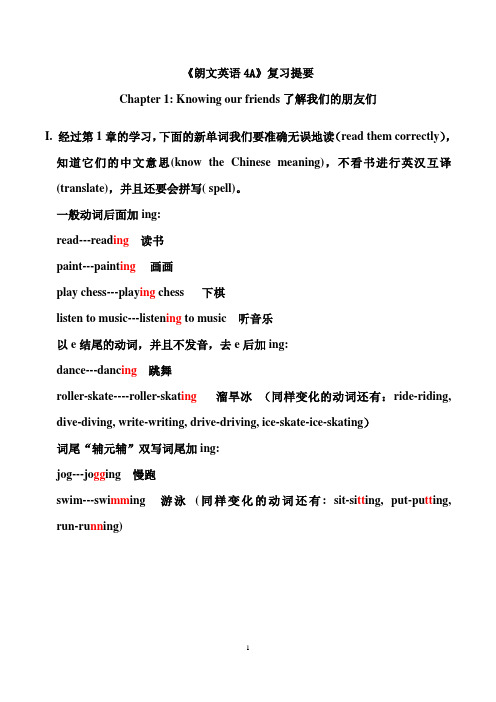
《朗文英语4A》复习提要Chapter 1: Knowing our friends了解我们的朋友们I. 经过第1章的学习,下面的新单词我们要准确无误地读(read them correctly),知道它们的中文意思(know the Chinese meaning),不看书进行英汉互译(translate),并且还要会拼写( spell)。
一般动词后面加ing:read---read ing读书paint---paint ing画画play chess---play ing chess 下棋listen to music---listen ing to music 听音乐以e结尾的动词,并且不发音,去e后加ing:dance---danc ing 跳舞roller-skate----roller-skat ing溜旱冰(同样变化的动词还有:ride-riding, dive-diving, write-writing, drive-driving, ice-skate-ice-skating)词尾“辅元辅”双写词尾加ing:jog---jo gg ing 慢跑swim---swi mm ing 游泳(同样变化的动词还有: sit-si tt ing, put-pu tt ing, run-ru nn ing)II.句型:like +doing喜欢做某事下面的关键句型我们要会读(read), 知道意思(know the Chinese meaning), 会根据不同的语境来运用(use them in different contexts),会写(write them correctly)。
English corner英语角(在英语角我们用英语交流,是练习英语口语的地方)in your spare time 在你的空闲时间= when you are free 当你空闲时1. ---What do you like doing in your spare time?---I like swim ming, reading and listen ing to music.2. ---What do you like doing in your spare time?--- I like roller-skat ing, paint ing and read ing.拓展:--What do you like doing in your spare time?--I like shopping, reading books and cooking.--What do you like doing?--…注意:like 后面的动词要用ing形式,不管动词离like有多远,都要记得用ing 形式。
香港朗文4A单词及句子.xls
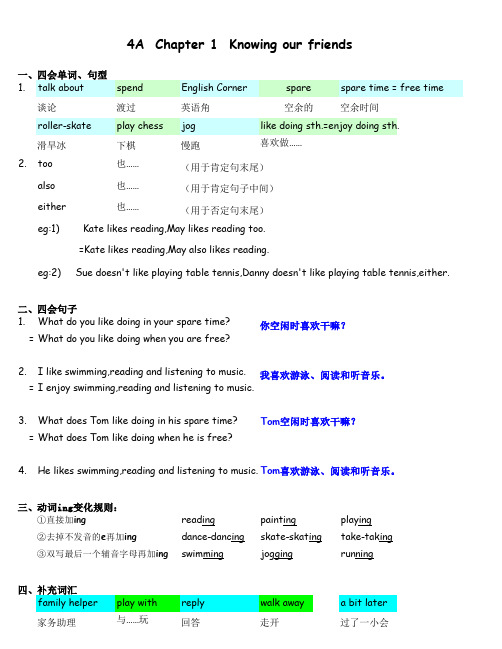
4A Chapter 1 Knowing our friends一、四会单词、句型1.talk about spend English Corner spare spare time = free time谈论 渡过英语角空余的空余时间roller-skate play chess jog like doing sth.=enjoy doing sth.滑旱冰下棋慢跑喜欢做……2.too也……(用于肯定句末尾)also也……(用于肯定句子中间)either也……(用于否定句末尾)eg:1) Kate likes reading,May likes reading too.=Kate likes reading,May also likes reading.eg:2) Sue doesn't like playing table tennis,Danny doesn't like playing table tennis,either.二、四会句子1.What do you like doing in your spare time?你空闲时喜欢干嘛?=What do you like doing when you are free?2.I like swimming,reading and listening to music.我喜欢游泳、阅读和听音乐。
=I enjoy swimming,reading and listening to music.3.What does Tom like doing in his spare time?Tom空闲时喜欢干嘛?=What does Tom like doing when he is free?4.He likes swimming,reading and listening to music.Tom喜欢游泳、阅读和听音乐。
三、动词ing变化规则:①直接加ing reading painting playing②去掉不发音的e再加ing dance-dancing skate-skating take-taking③双写最后一个辅音字母再加ing swimming jogging running四、补充词汇family helper play with reply walk away a bit later家务助理与……玩回答走开过了一小会solve puzzle sadly boring notes解决疑惑伤心地沉闷键盘piano slide swing钢琴滑梯秋千the youth center book dispiay central library 青少年活动中心书展中心图书馆sport centre City Hall city plaza体育活动中心市政厅市民广场4A Chapter 2 More about our friends一、四会单词和短语look after go to bed early late eat out get up 照顾,照看上床睡觉早迟外出用餐起床surf the Net play the recorder play the violin often sometimes always 上网吹直笛拉小提琴常常有时总是usually once twice never ever通常一次两次从不曾经二、三会单词polite same spilt(spill过去式)有礼貌相同的溢出angry invite friendly生气邀请友善的take photos cookbook wish拍照烹饪书希望三、四会句子1.Do you ever tidy your room?你曾经整理你的房间吗?yes,I usually tidy my room.是的,我经常整理我的房间。
最新香港朗文4A各单元知识要点 词汇语法

4A Chapter1 背诵内容一.单词部分n.名词v.动词pron. 代词prep. 介词adj. 形容词adv. 副词conj. 连词num. 数词art. 冠词interj.感叹词Part I.1.activity [ækˈtɪvətɪ] n. 活动2.spare [speə] adj. 空余的,空闲的3.roller-skate ['rəʊləˌskeɪt] v./n. 滚轴溜冰; 滚轴溜冰鞋4.jog [dʒɒg] v. 慢跑5.too [tu:] adv. 太;也6.either [ˈaɪðə] adv./pron. 也(否定句);(两者中)任何一个7.reply [rɪˈplaɪ] v. 回答Part II. Past form(过去式)walk—walked ask—asked reply—replied say—said draw-drew be—was/were think—thought go—went get—got leave-leftPart III. Gerund (动名词)1 一般情况下,直接在动词后加-ingwork ---- working sleep ----- sleeping study ----- studying2 动词以不发音的-e结尾,要去-e加-ingtake ----- taking make ----- making dance ----- dancing3 重读闭音节的动词,且词尾字母符合辅元辅规则,要双写词尾字母,再加-ing cut ----- cutting put ----- putting begin ------ beginning单音节为重读音节,只是不写重音符合4 以-ie结尾的动词,把变成y再加-inglie ----- lying tie ----- tying die ----- dying二.词组部分1.i n one’s spare time在某人的空余时间2.listen to (the) music 听音乐3.play chess 下棋4.like/love/enjoy doing 喜欢干某事5.go swimming (去)游泳6.go jogging (去)慢跑7.go roller-skating (去)溜冰8.be good at sth./doing 擅长于某事/干某事9.be poor at sth./doing 不擅长于某事/干某事10.be interested in sth./doing 对干某事/干某事感兴趣11.be afraid of sth./doing 害怕某事/干某事12.at/on the weekend 在周末at/on weekends13.on weekdays 在工作日14.be busy with sth. 忙于某事15.be busy doing 忙于干某事16.enjoy oneself= have a good time 某人玩得很开心17.a family helper 一位家庭帮手18.pick up kids 接小孩19.play the piano/violin 弹钢琴,拉小提琴(西洋乐器名词前加the )20.play Erhu 拉二胡(民族乐器前无the)21.play table tennis 打羽毛球(球类名词前无the)22.play on the swing/slide 在秋千(滑滑梯)上玩23.play with sb. 与某人一起玩24.play with sth. 玩耍某物25.a bit later 一会儿以后26.walk away sadly 难过地走开了27.walk the dog 溜狗28.walk home=go home on foot 走回家29.go home =go back home 回家30.after that 在那以后31.the black notes (钢琴上)黑键32.see sb. doing 看到某人在干某事33.make a new friend named Tom 交了一个叫汤姆的朋友34.in fact = actually/ˈæktʃʊəlɪ/事实上35.in the gym 在体育馆36.indoor stadium /'steɪdɪəm/ 室内体育馆37.finish sth./doing sth. 完成某事/干某事38.be important to sb. 对某人而言是重要的(绿色字体部分为拓展内容,供学有余力的小朋友默写。
Welcome to English(WTE)香港朗文4A unit1-1课件
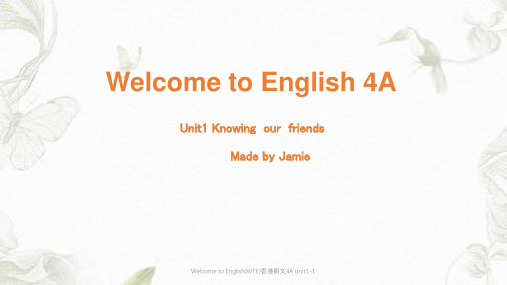
danceing.
Welcome to English(WTE)香港朗文4A unit1-1
like doing like to do ?
like doing sth表示一种长期的习惯 和爱好,以前就喜欢,还可能持续
like to do 是表示偶然的一次或者几次、想 要去做某事
Welcome to English 4A
Unit1 Knowing our friends Made by Jamie
Welcome to English(WTE)香港朗文4A unit1-1
Part a
Welcome to English(WTE)香港朗文4A unit1-1
Unit1 Knowing our friends
+5
Welcome to English(WTE)香港朗文4A unit1-1
+5
What do you like doing in your spare time? I like playing the piano, swimming and watching TV.
Welcome to English(WTE)香港朗文4A unit1-1
ate use
二、闭音节:辅+元+辅…闭音节是以一个元音字母加一个或几个辅音字母 结尾的音节(在闭音节中元音字母不发它本身的音) 重读闭音节就是最后一个音节是重读音节,当然,当某个词只有一个 音节而且末尾是辅音字母的话也是闭音节词。 如:get/get/是闭音节单词。而game/geim/却是开音节词。 begin/bi'gin/就是重读闭音节词。farmer由于重音落在 第一个音节就不是重读闭音节。
香港朗文4Achapter-1完整ppt

spare time=free time
Activities in spare time
read reading
I like reading .
paint painting
dance dancing
roller-skate roller-skating
jog jogging
jog /dʒɒg/慢跑
Part a
Unit1 Knowing our friends
know: v.知道; 了解; 认识; 确信 了解我们的朋友
+2
corner
/'kɔ:nə(r)/ n.拐角;角落
+2
The English Club members are talking about how they spend their spare time. club /klʌb/ n.社团;夜总会;俱乐部,会所 member /ˈmembə/ n.成员;分子
小知识:重读闭音节
在动词的现在分词、过去分词等时态变化及比较级最高级的变化中 重度闭音节的词要双写最后一个字母+…
practice
What do you like doing in your spare time?
新思维4A第1单元教案
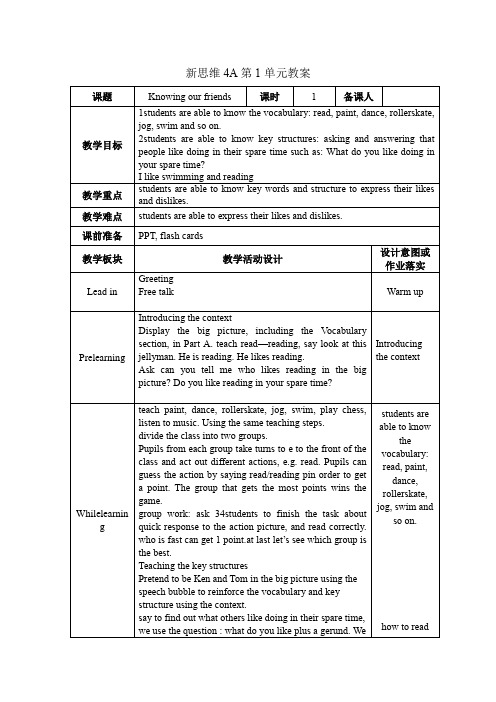
I like ________, _________ and _________.
They get one point for saying their sentences correctly .
Invite other pupils from the two groups to continue the activity.
Point at Eric and Sally, pretend to be them.
What do you like doing in your spare time?
I like rollerskating, painting and reading.
They take turns to answer the question by picking a card and forming sentences using the hints on the card, e.g.
I like swimming and reading
教学重点
students are able to know key words and structure to express their likes and dislikes.
教学难点
students are able to express their likes and dislikes.
Reinforcing the vocabulary and key structures using the context. Display the big picture. Pretend to be Lily, Sally and Mary and read aloud what they say.
完整word版)香港朗文4A总结U1-U7

完整word版)香港朗文4A总结U1-U7 4A Unit SummariesUnit One:Key grammar and vocabulary:Read - readingRoller-skate - roller-skatingPlay - playingDraw - drawingPaint - paintingJog - joggingXXX - listeningGo - goingDance - dancingSwim - swimmingWalk - walkingKey XXX structures:What do you like doing?" - "I like swimming。
XXX."I like reading too." XXX."Let's go ice-skating."Key phrases:Like doing in your spare time Play table XXXPlay on the swingsI'm busyWalk awayLook atGo ice-skatingIrregular past XXX:Are - wereSay - saidGet - gotLeave - leftGo - wentThink - thoughtUnit Two:Key grammar and vocabulary:AlwaysXXXAsk - askedReply - repliedWalk - XXXPlay with sb.Play on the slideDraw a trainWalk the dogPlay the pianoUsuallyNeverXXXKey XXX structures:Do you ever tidy your room?" - "Yes。
Welcome to English(WTE)香港朗文4A unit1-1优秀精选课件
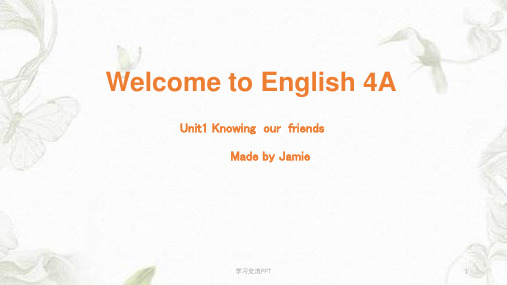
like doing sth表示一种长期的习惯 和爱好,以前就喜欢,还可能持续
like to do 是表示偶然的一次或者几次、想 要去做某事
学习交流PPT
18
verbC “ ing” form
} read
paint play
reading painting playing
直接 +ing
listen
6
Activities in spare time
学习交流PPT
7
read
学习交流PPT
8
paint
学习交流PPT
9
dance
学习交流PPT
10
roller-skate
学习交流PPT
11
jog /dʒɒg/慢跑
学习交流PPT
12
swim
学习交流PPT
13
play chess/tʃes/国际象棋
1. too用于肯定句句末,其前加逗号时,表示“也、还”之意。 例如:I know the answer, too.我也知道这个答案。
2. too修饰形容词或副词,作程度状语时,表示“太、过份”之意。 例如:He speaks too fast. 他讲话太快。
3. too也可用在口语中,表示“真是、很、非常(= very)”之意。 例如:I’m too happy. 我非常幸福
Welcome to English 4A
Unit1 Knowing our friends Made by Jamie
学习交流PPT
1
Part a
学习交流PPT
2
Unit1 Knowing our friends
know: v.知道; 了解; 认识; 确信 了解我们的朋友
(完整word版)香港朗文4A总结U1-U7
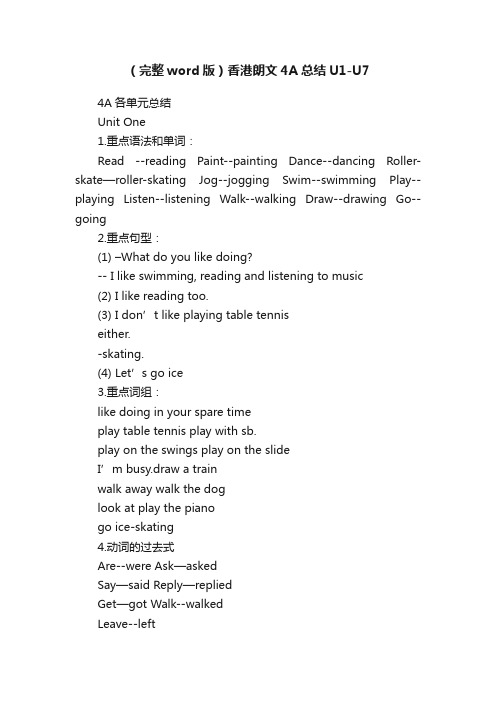
(完整word版)香港朗文4A总结U1-U74A各单元总结Unit One1.重点语法和单词:Read --reading Paint--painting Dance--dancing Roller-skate—roller-skating Jog--jogging Swim--swimming Play--playing Listen--listening Walk--walking Draw--drawing Go--going2.重点句型:(1) –What do you like doing?-- I like swimming, reading and listening to music(2) I like reading too.(3) I don’t like playing table tenniseither.-skating.(4) Let’s go ice3.重点词组:like doing in your spare timeplay table tennis play with sb.play on the swings play on the slideI’m busy.draw a trainwalk away walk the doglook at play the pianogo ice-skating4.动词的过去式Are--were Ask—askedSay—said Reply—repliedGet—got Walk--walkedLeave--leftGo—wentThink--thoughtUnit two1.重点语法和单词:Always Usually OftenSometimes Never2.重点句型:(1)--Do you ever tidy your room?-- Yes, I usually tidy my room.(2)—Does she ever play the violin?-- No, she never plays the violin.-- No, she doesn’t play the violin.3.重点词组:look after your pets go to bed earlytidy your room eat outget up late surf the Netget angry talk to sb.take photos invite sb. to one’s homeam/is/are good at something show one around look around go into the dining roomenjoy the meal play a lot of musicplay the recorder play the pianoplay the violin play a lot of sportplay pingpong play table tennisplay football watch football matches4.动词的过去式say—said talk—talkedcan—could ask--askedthink—thought show--showedhave—had call—calledwill--would enjoy--enjoyedspill—spilled/spilttake--tookgo--wentUnit Three1.重点语法:am/is/are--was are--were ask--asked like--likedfly--flew make--made flick--flicked want--wantedcatch--caught draw—drew stay--stayed happen--happened put--put say--said Play--playedhave/has--had hit--hitkeep--kept go--wentlose--lost do--didwin--won2.重点单词和词组:cola fast food CDscomics clocks air-consmobile-phones rickshaw an oil lampclogs camera fanstove play computer games fly kitesplay hopscotch make nets catch butterfliesplay marbles draw a circle on the groundgo out of the circle want to +动词原形flick the shooter into thecirclego out a lot of credit cardswear trainers have telephones check your answerask someone3.重点句型:(1)--Was there any cola when you were young?-Yes, there was.(2)The game I like best was marbles.(3)How do you play marbles?(4)– Did you wear trainers fifty years ago?--Yes, I did.(5)—Did you have a telephone?-- No, I didn’t. Rich people had telephones at home but poor people didn’t.(6 ) – Did you shop at the supermarket?--- No, I didn’t. There weren’t any supermarkets.(7) – Did you go to school?-- No, I didn’t. Rich children go to school but poor children didn’t.(8) –Did you listen to the radio?-- Yes, I did.Where(哪里)do you like going to in your holiday?How(如何)do you help at home?How much (多少钱,提问不可数名词)is it? --- It is five dollars.How many (多少,提问可数名词)books in your home?What time(什么时间)is it?What(什么)are you doing now? ----I am doing my homework.What(什么)is the weather like today? ----It’s windy.What color (什么颜色)is it? ---- It is red.What (什么)are you? ( What do you do?) -----I am a driver.When(什么时候)is your birthday? ---on 2nd MayHow old(多大)are you? ----I am ten.Who (谁) are you? -----I am David.Which(哪一个) club do you want to join?Why(为什么)do you like playing football?----Because I like being healthy.Unit Four1.重点单词和词组:cotton clothes silk clothes a horse a sedan chair silver and gold paper money a village a town do one’s homework feel sleepy after a while fall asleep strange friendly missWhy don’t you post office explain suddenly wake upcelebrate cook with firewood Ride horses Travel by sedan chair Chinese NewYearTravel by boat Send letters Rich people supermarket Cook with gasLook tired This is fun Live in flats Keep in touch with Be away fromhome2.动词过去式:wear—wore ride—rode travel—travelled walk—walked feel—felt take—took miss—missed write—wrote explain—explained wake—woke3.重点句型(1)How did people travel?——Most/Rich/Some people travelled by boat/sedan chair.(2)What did people wear?——Most/Rich people wore cotton clothes/silk clothes.(3)May I use your phone?(4)Why don’t you+动词原形(5)How do you want to send your letter?——By...... .(6)Were there any supermarkets?——No,there weren’t.Unit Five:1.重点单词词组science museum a horse a camel a giraffe an owla peacock an eagle a hippo leader come forwardwise look after talk about eel sharkdolphin starfish crab come down breakdirection scary feather noisy hairy tiny wolf crocodile penguin parrotbee fly cockroach shiny silver2.单词过去式meet—met come—came say—said speak—spoke catch—caughtswim—swam shout—shouted break—broke save—saved3.形容词比较级最高级Tall-taller-tallest Heavy-heavier-heaviestBig-bigger-biggest Small-smaller-smallest Pretty-prettier-prettiestFast-faster-fastest Strong-stronger-strongestGood-better-best Long-longer-longest4.重点句型(1)The horse, the camel and the giraffe are tall.The camel is taller than the horse.The giraffe is the tallest.(2)I’m stronger than all of you.Unit Six:1.重点单词和词组villages islands temples crocodiles snakesa boat trip a camel trip a helicopter trip a waterfall a rivera cave at the beach proud powerful show offshow sb around country politely an hour a thick jungle different plant huge later fly overmountain dangerous fantastic too tired at the beginningof restaurant activity enjoyable exciting wonderful2.形容词比较级最高级interesting-more interesting-the most interesting exciting-more exciting-themost excitingpowerful-more powerful-themost powerfulbeautiful-more beautiful-the most beautifuldangerous-more dangerous-the most dangeroushigh-higher-highest nice-nicer-nicest wide-wider-widest light-lighter-lightest3.重点句型(1)We visited some interesting places.The villages were more interesting than the temples.The islands were the most interesting.(2)Let me show you around my country.Let sb +do(动词原形)(3)Isn’t it big?——Yes, it’s huge.(4)Are we near your home yet?——Oh,no.It’s still a long way away.Unit Seven1.单词词组汇总learn a lesson character list forest insect busyquickly slowly work hard collect build a newhomebright light up path naughty loudlysoftly match carefully careless Don’t worry drop burn down be afraid of warn Look out get away speak angrily steal dirty rubbish bin clean up stranger fly off2.过去式light—lighted(lit)drop—dropped burn—burned steal—stole fly—flew happen—happenedstart—started try—tried get—got3.重点句型(1)The insects are busy today,aren’t they?——Yes,they are.(2)What are they?——They are......(3)Did you steal the matches?——Yes,I did.(4)Why did you fly off with the burning match?——Because I.......。
香港朗文4a各单元总结教学提纲

香港朗文4a各单元总结4a各单元总结Unit One1.重点语法和单词:2.重点句型:(1) –What do you like doing?-- I like swimming, reading and listening to music(2) I like reading too.(3) I don’t like playing table tennis either.(4) Let’s go ice-skating.3.重点词组:4.动词的过去式Unit two1.重点语法和单词:2.重点句型:(1)--Do you ever tidy your room?-- Yes, I usually tidy my room.(2)—Does she ever play the violin?-- No, she never plays the violin.-- No, she doesn’t play the violin.3.重点词组:4.动词的过去式Unit Three1.重点语法:2.重点单词和词组:3.重点句型:(1)--Was there any cola when you were young?-Yes, there was.(2) The game I like best was marbles.(3) How do you play marbles?(4)– Did you wear trainers fifty years ago?--Yes, I did.(5)—Did you have a telephone?-- No, I didn’t. Rich people had telephones at home but poor people didn’t.(6 ) – Did you shop at the supermarket?--- No, I didn’t. There weren’t any supermarkets.(7) – Did you go to school?-- No, I didn’t. Rich children go to school but poor children didn’t.(8) –Did you listen to the radio?-- Yes, I did.Where(哪里)do you like going to in your holiday?How(如何)do you help at home?How much (多少钱,提问不可数名词)is it? --- It is five dollars. How many (多少,提问可数名词)books in your home?What time(什么时间) is it?What(什么)are you doing now? ----I am doing my homework.What(什么) is the weather like today? ----It’s windy.What color (什么颜色)is it? ---- It is red.What (什么)are you? ( What do you do?) -----I am a driver.When(什么时候)is your birthday? ---on 2nd MayHow old(多大)are you? ----I am ten.Who (谁) are you? -----I am David.Which(哪一个) club do you want to join?Why(为什么)do you like playing football?----Because I like being healthy.。
完整)香港朗文4a各单元总结,推荐文档

完整)香港朗文4a各单元总结,推荐文档Unit One Summary:In Unit One。
we XXX。
Some of the key verbs we learned were read。
roller-skate。
play。
draw。
paint。
jog。
listen。
go。
dance。
swim。
and walk。
We also learned how to talk about our likes and dislikes using the sentence pattern "What do you like doing?" and "I like。
" or "I don't like。
"。
nally。
XXX such as "like doing in your spare time," "play table tennis," "play on the swings," "I'm busy," "walk away," and "go ice-skating"。
Finally。
we learned the past tense of some common verbs such as are。
say。
get。
leave。
go。
and think.Unit Two Summary:In Unit Two。
we focused on XXXXXX pattern "Do you ever。
" and "Yes。
I usually。
" or "No。
I never。
"。
nally。
XXX such as "look after your pets," "tidy your room," "get up late," "go tobed early," and "eat out"。
